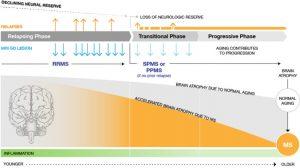Multiple sclerosis (MS) is a complex autoimmune disorder where the immune system attacks the protective covering of nerves, leading to progressive neurological damage. For patients with relapsing-remitting MS (RRMS), early treatment is crucial to prevent irreversible damage. Historically, treatment started with lower-efficacy drugs, escalating only when symptoms worsened. However, recent data suggests that using high-efficacy therapies (HETs) early in treatment can significantly improve outcomes.
High-efficacy therapies, such as ocrelizumab, natalizumab, ofatumumab, and alemtuzumab, have shown to reduce the rate of relapses and brain lesions in patients who begin treatment soon after diagnosis. These therapies work by suppressing inflammatory activity and minimizing neurological damage during the early stages of MS, a critical window where the disease is most active.

Fig. 1 Natural history of MS. Gd gadolinium, MRI magnetic resonance imaging, MS multiple sclerosis, PPMS primary progressive multiple sclerosis, RRMS relapsing–remitting multiple sclerosis, SPMS secondary progressive multiple sclerosis
Importantly, starting treatment with HETs may prevent the accumulation of disability, which is often irreversible once it begins. Long-term studies demonstrate that early intervention with these therapies can protect patients from significant declines in quality of life and cognitive function. The move toward early use of HETs represents a shift from a conservative, step-up approach to a more aggressive, protective strategy against disease progression.
However, HETs carry risks, such as increased infections and autoimmune complications, making patient selection and monitoring vital. Patients and healthcare providers must work closely together to weigh the benefits and risks, ensuring that the treatment aligns with individual needs and medical histories.
This study emphasizes the need for a personalized approach to RRMS treatment, advocating for more widespread early use of high-efficacy therapies to improve long-term patient outcomes.
Journal Article: Freeman, Léorah, et al. “High-Efficacy Therapies for Treatment-Naïve Individuals with Relapsing–Remitting Multiple Sclerosis.” CNS Drugs, 9 Nov. 2022.
Summary by Faith Oluwamakinde










